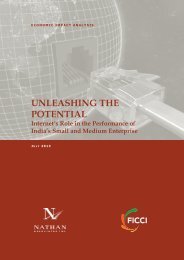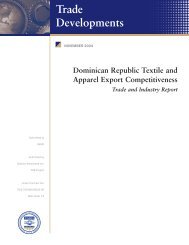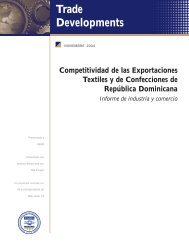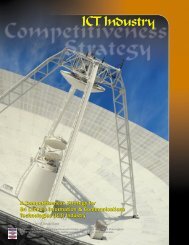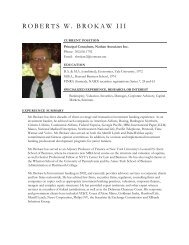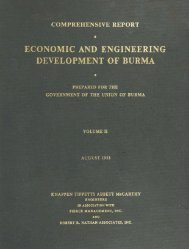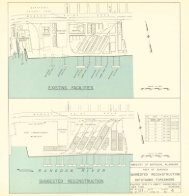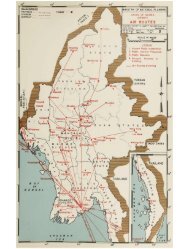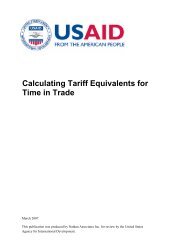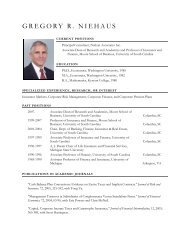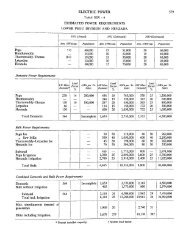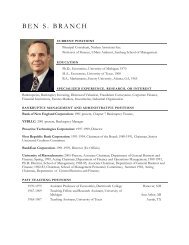Putting it to Work in Developing Countries - Nathan Associates
Putting it to Work in Developing Countries - Nathan Associates
Putting it to Work in Developing Countries - Nathan Associates
You also want an ePaper? Increase the reach of your titles
YUMPU automatically turns print PDFs into web optimized ePapers that Google loves.
Investment promotion agency (IPA). Government or<br />
quasi-government organization set up <strong>to</strong> <strong>in</strong>crease a<br />
country’s <strong>in</strong>ward <strong>in</strong>vestment through image-build<strong>in</strong>g,<br />
promotion, <strong>in</strong>ves<strong>to</strong>r services, and improv<strong>in</strong>g the <strong>in</strong>vestment<br />
climate.<br />
Investment promotion <strong>in</strong>termediary (IPI). Any of the<br />
various public, private, and civic organizations <strong>in</strong>volved<br />
<strong>in</strong> <strong>in</strong>vestment promotion (e.g., <strong>in</strong>vestment promotion<br />
agencies, export process<strong>in</strong>g zones, chambers of commerce,<br />
commercial attaches).<br />
Inves<strong>to</strong>r roadmap. A USAID <strong>to</strong>ol for identify<strong>in</strong>g policy<br />
and adm<strong>in</strong>istrative barriers <strong>to</strong> <strong>in</strong>vest<strong>in</strong>g and operat<strong>in</strong>g<br />
a bus<strong>in</strong>ess <strong>in</strong> develop<strong>in</strong>g countries by four stages:<br />
entry, establishment, location, and operation.<br />
“Ladder Effect.” Mov<strong>in</strong>g up the production value<br />
cha<strong>in</strong> of the same or for new products through add<strong>it</strong>ional,<br />
higher-value use of technology or human cap<strong>it</strong>al<br />
as <strong>in</strong>put. Reflects dynamic location advantage.<br />
Liberalization, <strong>in</strong>vestment. National or regional policy<br />
that aims <strong>to</strong> reduce regula<strong>to</strong>ry controls and legal<br />
restrictions on the movement of <strong>in</strong>vestment cap<strong>it</strong>al.<br />
Liquid<strong>it</strong>y. The abil<strong>it</strong>y, access, and flexibil<strong>it</strong>y of convert<strong>in</strong>g<br />
economic assets <strong>in</strong><strong>to</strong> cash.<br />
Location advantage. Similar <strong>to</strong> comparative advantage<br />
but <strong>in</strong>corporates the entire package of favorable policy,<br />
<strong>in</strong>centives, strategic opportun<strong>it</strong>y, and other tangible<br />
and nontangible benef<strong>it</strong>s mak<strong>in</strong>g a country or region<br />
attractive <strong>to</strong> foreign <strong>in</strong>ves<strong>to</strong>rs.<br />
Major<strong>it</strong>y-owned foreign affiliate (MOFA). Branch of a<br />
mult<strong>in</strong>ational corporation <strong>in</strong> which the parent company’s<br />
equ<strong>it</strong>y stake exceeds 50 percent.<br />
Market-seek<strong>in</strong>g FDI. Investment undertaken <strong>to</strong> produce<br />
for and serve a domestic or regional market, <strong>to</strong><br />
access a large consumer market (i.e., Ch<strong>in</strong>a), or sometimes<br />
<strong>to</strong> circumvent barriers <strong>to</strong> serv<strong>in</strong>g the target market<br />
through export<strong>in</strong>g from the home country.<br />
Multilateral Agreement on Investment (MAI). Accord<br />
proposed at the OECD <strong>to</strong> provide b<strong>in</strong>d<strong>in</strong>g rules govern<strong>in</strong>g<br />
foreign <strong>in</strong>vestment. International negotiations<br />
were suspended <strong>in</strong> 1998.<br />
Multi-Fibre Arrangement (MFA). A quota system for<br />
the textiles and apparel <strong>in</strong>dustry that for many decades<br />
perm<strong>it</strong>ted developed countries, predom<strong>in</strong>antly the<br />
Un<strong>it</strong>ed States and the European Union, <strong>to</strong> restra<strong>in</strong><br />
imports of covered products from low-cost production<br />
s<strong>it</strong>es abroad. As a result of quotas on the most compet<strong>it</strong>ive,<br />
large-scale producers, producers <strong>in</strong> other low-cost<br />
s<strong>it</strong>es (primarily poorer develop<strong>in</strong>g countries) were able<br />
<strong>to</strong> attract foreign direct <strong>in</strong>vestment <strong>to</strong> the apparel<br />
sec<strong>to</strong>r. Elim<strong>in</strong>ation of the quotas was agreed <strong>in</strong> 1995<br />
under the World Trade Organization Agreement on<br />
Textiles and Cloth<strong>in</strong>g, and phased <strong>in</strong> over a ten-year<br />
period. Quotas were abolished <strong>in</strong> January 2005. Many<br />
countries that had developed significant apparel <strong>in</strong>dustries<br />
as a result of quota-skirt<strong>in</strong>g foreign direct <strong>in</strong>vestment<br />
are worried about dis<strong>in</strong>vestment <strong>in</strong> the postquota<br />
world.<br />
Multilateral Investment Guarantee Agency (MIGA).<br />
An arm of the World Bank facil<strong>it</strong>at<strong>in</strong>g foreign <strong>in</strong>vestment<br />
<strong>in</strong> develop<strong>in</strong>g countries by provid<strong>in</strong>g pol<strong>it</strong>ical risk<br />
<strong>in</strong>surance for <strong>in</strong>ves<strong>to</strong>rs and <strong>in</strong>vestment promotion<br />
capac<strong>it</strong>y build<strong>in</strong>g for member countries.<br />
Mult<strong>in</strong>ational corporation, mult<strong>in</strong>ational enterprise<br />
(MNC or MNE). A company w<strong>it</strong>h productive operations<br />
<strong>in</strong> many different countries, as dist<strong>in</strong>guished from<br />
<strong>in</strong>ternational companies that operate <strong>in</strong> one country<br />
and export <strong>to</strong> others.<br />
National treatment. The handl<strong>in</strong>g of foreign goods,<br />
services, or <strong>in</strong>vestment no less favorably than compet<strong>in</strong>g<br />
local goods, services, or <strong>in</strong>vestment.<br />
Natural-resource-seek<strong>in</strong>g FDI. Cap<strong>it</strong>al <strong>in</strong>vestment for<br />
the exploration or explo<strong>it</strong>ation of raw materials such as<br />
petroleum, precious m<strong>in</strong>erals, and forestry products.<br />
Newly Industrialized Economies (NICs). Former<br />
develop<strong>in</strong>g countries that have experienced such rapid<br />
and susta<strong>in</strong>ed economic growth that they are now<br />
viewed as developed. The term was orig<strong>in</strong>ally used <strong>in</strong><br />
reference <strong>to</strong> East Asian countries, such as Taiwan,<br />
South Korea, and S<strong>in</strong>gapore, but <strong>it</strong> is sometimes used<br />
<strong>in</strong> reference <strong>to</strong> countries outside that region.<br />
Network trade. Trade w<strong>it</strong>h<strong>in</strong> a given product supply<br />
cha<strong>in</strong>, featur<strong>in</strong>g flow of parts, components, and other<br />
<strong>in</strong>termediate <strong>it</strong>ems <strong>to</strong> produce a f<strong>in</strong>al good. A key characteristic<br />
of global production cha<strong>in</strong>s. Contrasts w<strong>it</strong>h<br />
more trad<strong>it</strong>ional trade <strong>in</strong> f<strong>in</strong>al goods. See global production<br />
cha<strong>in</strong>s.<br />
Organization for Economic Co-operation and<br />
Development (OECD). Paris-based organization compris<strong>in</strong>g<br />
30 member countries (primarily developed)<br />
comm<strong>it</strong>ted <strong>to</strong> democratic government and the market<br />
economy. The OECD is best known for <strong>it</strong>s publications<br />
and statistics on globalization, corporate governance,<br />
<strong>in</strong>vestment promotion, susta<strong>in</strong>able development,<br />
and other global economic issues.<br />
Offshor<strong>in</strong>g. The practice of relocat<strong>in</strong>g a production<br />
activ<strong>it</strong>y, task, or process <strong>to</strong> a foreign country <strong>to</strong> cut production<br />
costs (e.g., a French car manufacturer relocates<br />
au<strong>to</strong> parts production <strong>to</strong> Morocco). The enterprise usually<br />
ma<strong>in</strong>ta<strong>in</strong>s ownership of foreign facil<strong>it</strong>ies.<br />
C-4



